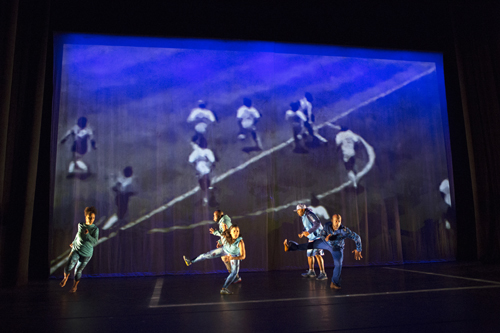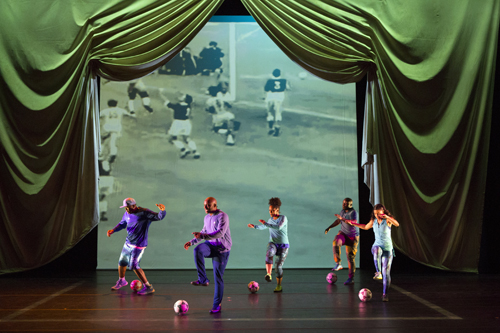Dance: /peh-LO-tah/
By Dawn Lille
arttimesjournal Oct 31, 2017
 /peh-LO-tah/ photo:Rebecca Greenfield |
Marc Bamuthi Joseph is a forty- year -old actor/dancer/writer born in New York, who now lives and creates in California. Of Haitian background, he has much to say about being a black man in America today. /peh-LO-tah/, the dance drama he and his collaborators presented at BAM October 18 – 21, shares many of these observations.
As the subtitle, “a futbol framed freedom suite,” implies, he sees this world game, known as soccer in the United States, as “the only thing the entire planet can do together.” Joseph has written the narrative for this work commissioned by the Kennedy Center for the Arts and the Museum of Contemporary Art Chicago and is direct about the social statements he is making. He sees the path he has chartered as one that connects the macro issue of economy to personal confrontation with his own body “as a figure in both sport and art.”
Joseph is exploring the “ecology of egalitarianism” as played out on the soccer field, intrigued by the fact that the concept of equality is elusive. The audience enters the theater and immediately shares a set with a large round luminous object projected on a plain dark backdrop and a soccer ball sitting in a pool of light on stage center.
The piece begins by using the excellent singing voices of the cast to rhythmically play with the three syllable Spanish word for ball, which is the name of the work. Joseph then starts the narrative with rap lyrics.
Often the performers move, sing, speak or do two things simultaneously in front of wide videos of soccer fields and specific instances like running breakouts and goal scoring, interspersed with recognizable clips of historical civil rights images, all by the designer David Szlasa. This moving backdrop gives its own complementary story line to the live parts of the production without distracting from or upstaging them.
 /peh-LO-tah/ l-r Tommy Shepherd, Marc Bamuthi Joseph, Amara Tabor-Smith, Yaw Agyeman, Traci Tolmaire photo:Rebecca Greenfield |
The choreographer Stacey Printz works in a contemporary jazz medium, but her movement for solos, duets, trios and the entire group of five relates to the runs and kicks of the game and the ball itself. Often the movements seem to flow from the backdrop to the on-stage dancers, who expand them spatially into sweeping arcs. Yet each performer seem to maintain a private space/territory around their own circumferences.
A movement theme seen early with a single performer is repeated later with all . A soccer ball rests on the floor in front of the dancer who proceeds to move over it in a series of leg lifting rhythmic jumps punctuated by a few strong diagonal kicks. This sets up a contrast between the body and the ball – or is it a dialogue? There is one sequence where an undulating body action rises through the top of the head and creates a moving force of its own.
Joseph writes in a program note that “the work is sprung from the bliss of a goal scorer’s run; it shares what his countrymen do after the ball beats the goalie, the closet thing going to freedom….” Onstage he says that if you cannot run you cannot play the game, but running implies freedom and he is often afraid to be free.
Soccer has taught him everything one has to know about America. It is a game that requires complete teamwork. Americans do not shine in it because in life they emphasize the success of the individual, which no American player is able to give up completely.
The dialogue is often personal. He says his son is now fourteen and he has been his soccer coach since age five. He wonders what will happen to this young black boy as he becomes a better soccer player and faces the world. He asks several questions: How do you keep the joy in black life? When was the last time you were truly free? What keeps me alive?
The music, composed by Tommy Shepherd who is also a member of the cast, is gospel-like, opera-like and sometimes full of hip hop. But it always propels the sensitive narrative and supports both the movement and the lyrics.
The cast, Amara Tabor-Smith, Traci Tolmaire, Yaw Agyeman (who wrote and composed one song), Shepherd and Joseph, are all part of The Living Word Project, based in San Francisco and committed to producing literary performnce “in the verse of our time.” Their spoken storytelling uses the body as a conduit and their work is focused on social issues of the present. They are all experienced, multi-talented individuals, much needed and appreciated in today’s divisive milieu.
dawnlille@aol.com
